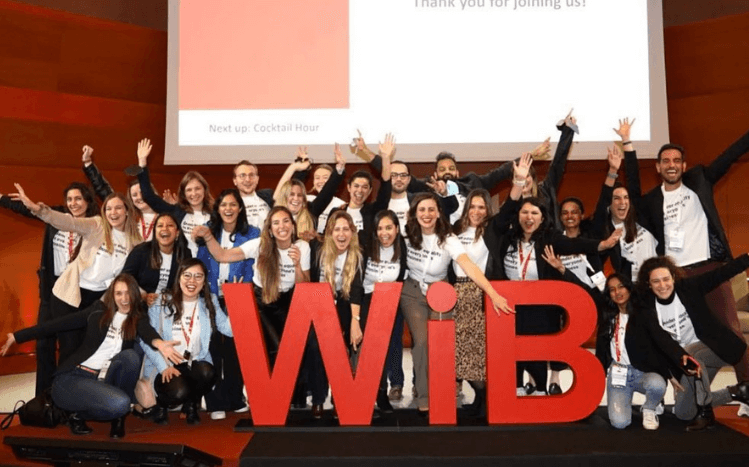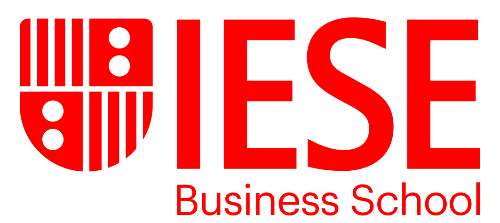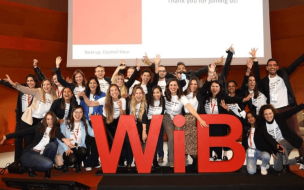In comparison to their male counterparts, women in business also face many challenges and obstacles to success.
According to a recent global Deloitte report, 58% of women in hybrid work situations have experienced exclusion from meetings and discussions. 59% of women in business have also experienced non-inclusive behaviors and micro-aggressions.
There are also major systemic issues at play, such as the gender pay gap, that continue to hold women in business back.
It’s important for business schools to empower the future female workforce, preparing women MBAs with the leadership skills, strategic insight, and network to succeed.
So, how can MBA programs help women in business?
1. Offering scholarships for women in business
To increase gender diversity within MBA programs, many business schools offer scholarships to women that range from full or partial cover of tuition-fees.
Having worked for six years at multinational oil and gas company ExxonMobil, Dhriti Hazarika was well-experienced as a woman in business within a male-dominated industry.
She felt, however, that she wanted a change in her career, and decided that joining an MBA program could help her to do just this.
Searching for a business school that she knew would support women in business such as herself, she came upon the IESE Business School MBA in Barcelona.
IESE Business School work to champion women in business through their Women Win agenda that aims to put female leaders in the best possible position to succeed such as by offering support and financial aid.
Dhriti was fortunate enough to receive a Forté Fellowship—a scholarship awarded in partnership with the Forté Foundation, a non-profit organization that addresses the stark gender gap in business and leadership roles.
IESE Business School also offers Women in STEM scholarships and Women in Management scholarships, through which students can receive up to 50% off tuition.
2. Striving for female representation on campus
To achieve gender parity across the business landscape, female representation needs to be across all levels.
The same is true at business school. If female representation is going to become an influential force, it must extend beyond the cohort of students to the faculty, including professors, admissions teams, and careers advisors.
During the admissions process for the IESE MBA program, Dhriti attended an assessment day where she met female faculty, alumni, and other potential women MBAs.
“There was a very strong sense of female community,” says Dhriti.
In the 2022 MBA cohort at IESE Business School, there are 37% women—a record-high that’s up from 31% in 2021.
“Coming from a very male-dominated career, it was refreshing to be among so many women,” says Dhriti.
IESE Business School also runs a ‘Men as Allies’ initiative, which emphasizes that gender inequality in business should be on everyone’s agenda.
“It was very reassuring to see men asking important questions and wanting to understand, considering how they can help to create a working culture where women can succeed,” says Dhriti.
3. Hosting women in business network events
Networking is key for women in business. Listening to one another’s experiences can empower future female leaders to reach high in their careers.
The Women in Business Club at IESE Business School is a student-run organization that hosts a series of events from industry panels, one-on-one coffee chats with company representatives, and happy hour networking events.
“It all comes back to the network—it’s one of the biggest tools you can tap into to feel empowered and on the path to success,” says Dhriti.
The annual Women in Business Conference brings together women from across industries and roles to discuss the future of women in business and how women can maximize their impact.
“It [is] invaluable to hear industry professionals [at the conference] speak about business reality solely from a female perspective,” says Dhriti.
Speakers discuss topics such as how to create a good work-life balance, operating in a male-dominated industry, tips on how to get your voice heard and a seat on the table, and how to climb the career ladder.
“It’s so important to see women in leadership positions and have mentors in the industry—this is what doing an MBA gives you.”
For the 2023 Women in Business Conference, IESE Business School will also welcome the first winners of the 'Future Female Leaders Award,' an initiative which awards inspiring professional women from outside of the school's student and alumni circle who are making an impact on the business world.
In a business world where women can constantly feel like they're competing, recognition of their efforts is crucial for empowerment.
4. Running workshops that address challenges women in business face
It’s no secret that women in business face a disproportionate set of challenges that are often related to misconceptions, prejudices, and stereotypes.
“I’ve had comments about the way I communicate. I’ve been told ‘don’t be too friendly or smile so much’ or speculation about what I can handle, and decisions being made for me,” says Dhriti.
At IESE Business School, the Women in Business Club runs workshops to give women the skill set and insight needed to tackle these challenges. These include salary negotiation advice, communication skills, and even self-defense classes.
Since completing the MBA program at IESE Business School, Dhriti has completed the famous MBA ‘triple-jump’—switching function, industry, and location—to become a consultant at Big Three consulting firm Boston Consulting Group (BCG).
Despite still working in a disproportionately male dominated industry, Dhriti says the MBA program empowered her to make her mark and work her way up the career ladder.








